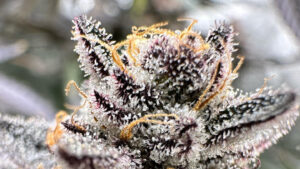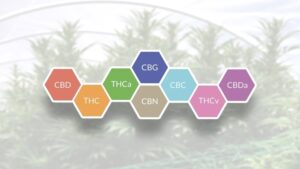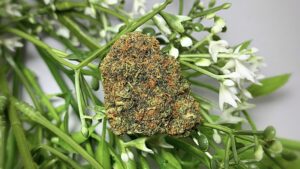Our series, “Let’s Be Clear,” aims to shed light on commonly misunderstood topics within the dynamic world of cannabis, offering insights and clarity to enthusiasts and newcomers alike.
Navigating the nuanced world of THC variations can be perplexing, especially given the recent surge in delta-8 products flooding the market. From gas stations to convenience stores, signs advertising these products lead many to question the legality surrounding THC. For those who are unaware of the existence of multiple THC variations, the landscape can seem even more bewildering.
As cannabis continues to gain mainstream acceptance, it’s essential to stay up-to-date on the ever-expanding array of products accessible to consumers. Understanding the disparities between delta-8 and delta-9 comes down to recognizing their origins, chemical compositions, legal standings, and medicinal applications.
Delta-9 THC
Delta-9 THC, derived from the cannabis plant, is the most well-known cannabinoid in the world. This is the classic THC that you have likely encountered in health class or pop culture. It is famous for its psychoactive effects, commonly referred to as the “high” it induces. Delta-9 THC generally brings about heightened appetite, feelings of euphoria, relaxation, increased sociability, and laughter. Research suggests its potential in treating a broad spectrum of medical conditions, notably pain and nausea, along with neurological disorders like multiple sclerosis (MS). Delta-9 THC was once the sole cannabinoid of public interest until the landscape shifted with the legalization and regulation of hemp. This change, facilitated by the passage of the 2018 Farm Bill, opened the doors for CBD but consequently paved the way for the emergence of delta-8 products in the market.
The 2018 Farm Bill
The 2018 Farm Bill, officially known as the Agriculture Improvement Act of 2018, significantly altered the cannabis industry by federally legalizing the cultivation and sale of hemp, provided it contains less than 0.3% delta-9 THC. This pivotal legislation not only reclassified hemp as an agricultural commodity, thereby opening the market for hemp-derived products like CBD, but it also indirectly facilitated the rise of delta-8 THC products. By legalizing hemp, the bill enabled the expansion of the CBD market across the United States, making therapeutic, non-psychoactive CBD products widely accessible to consumers. Additionally, it created a legal gray area for delta-8 THC, a cannabinoid synthesized from CBD derived from legally cultivated hemp, leading to a burgeoning market despite its psychoactive properties.
However, the 2018 Farm Bill also introduced legal ambiguities, especially regarding delta-8 THC, whose federal legality contrasts with the controlled status of delta-9 THC, resulting in a complex regulatory environment. Some states have responded by regulating or banning delta-8 THC products, citing consumer safety and regulatory oversight concerns. As the cannabis industry continues to evolve, further legislative and regulatory developments are expected, necessitating an informed and cautious approach from stakeholders. Cottonmouth Dispensary remains committed to providing customers with safe, high-quality cannabis products that comply with current laws and regulations, offering a range of products that cater to various preferences and needs while emphasizing compliance and consumer education.
CBD
Cannabidiol (CBD), the second most abundant cannabinoid in cannabis, is highly regarded for its potential health benefits. Unlike THC, the primary psychoactive cannabinoid, CBD offers therapeutic properties without altering the consumer’s mental state. While commonly available in sublingual tinctures, the enactment of the 2018 Farm Bill allowed the CBD market to expand, bringing out a variety of products, including flowers, edibles, and concentrates. CBD products come in three primary formulations: CBD isolate (containing only CBD), broad-spectrum (containing all cannabinoids except THC), and full-spectrum products (containing all cannabinoids, including THC).
Research into CBD’s pain-relieving, anxiety-reducing, and anti-inflammatory properties continues to uncover its potential benefits for a wide range of medical conditions. For starters, CBD stands out as a potent antioxidant, surpassing the potency of both vitamin C and E. It also shows potential in… While CBD does not produce a state of intoxication, its consumption may lead to a reduced appetite, dry mouth, heightened relaxation, or drowsiness. Many cannabis patients experience medicinal results from high doses of CBD, commonly combined with small doses of THC.
Delta-8 THC
Delta-8 THC, derived from cannabis and hemp plants, exists in much smaller qualities compared to delta-9 THC. While it shares some effects with delta-9, such as inducing relaxation and increasing appetite, its influence is normally milder. Delta-8 is synthesized from CBD and is legal at the federal level, requiring no license to sell. Although delta-8 THC naturally occurs in cannabis, its presence is extraordinarily miniscule. This has led hemp farmers, regularly faced with surplus products, to convert their CBD into a laboratory-produced cannabinoid. Similarly, scientists have devised several methods, such as isomerization, to extract higher quantities of delta-8 THC from CBD. While the concept of man-made cannabinoids may understandably cause weariness among consumers, studies suggest that delta-8 THC may hold promise for medicinal application, including alleviating nausea, stimulating appetite, and aiding in the management of seizures.
Similarities Between Delta-8 THC and Delta-9 THC
Both delta-8 and delta-9 THC are cannabinoids that share a similar molecular structure, with slight variations that lead to different effects. They both interact with the body’s endocannabinoid system, which plays a role in regulating various physiological processes. Both compounds can induce feelings of relaxation, euphoria, and increased appetite, and they both have potential therapeutic applications. Additionally, both delta-8 and delta-9 THC can produce positive results on drug tests, which can be a consideration for consumers.
Differences Between Delta-8 THC and Delta-9 THC
To differentiate, delta-9 THC is a naturally occurring compound that produces the most pronounced mind-altering effects, or sense of intoxication, while delta-8 THC is often lab-engineered with a less potent high. CBD on the other hand, is a naturally occurring compound but does not induce intoxication. Both delta-8 and delta-9 THC may stimulate appetite, while isolated CBD might decrease it. Additionally, delta-8 and delta-9 THC can be detected in a drug test unlike CBD isolate. However, drug tests may detect broad-spectrum or full-spectrum CBD due to the inclusion of other cannabinoids. The legal status of each cannabinoid varies, with CBD and delta-8 THC technically legalized under the Farm Bill, though there is uncertainty surrounding delta-8 THC. While federally legal, some states have banned delta-8 THC due to fair concerns for consumer safety in the unregulated market. After all, it is far less regulated and studied in comparison to delta-9 THC, which is illegal on the federal level, but legal in states with recreational or medical cannabis programs.
At Cottonmouth Dispensary, we exclusively provide delta-9 THC products, ensuring our customers have access to the finest quality cannabis products available. For those interested in CBD, we offer full-spectrum products containing high CBD concentrations and low THC concentrations.




